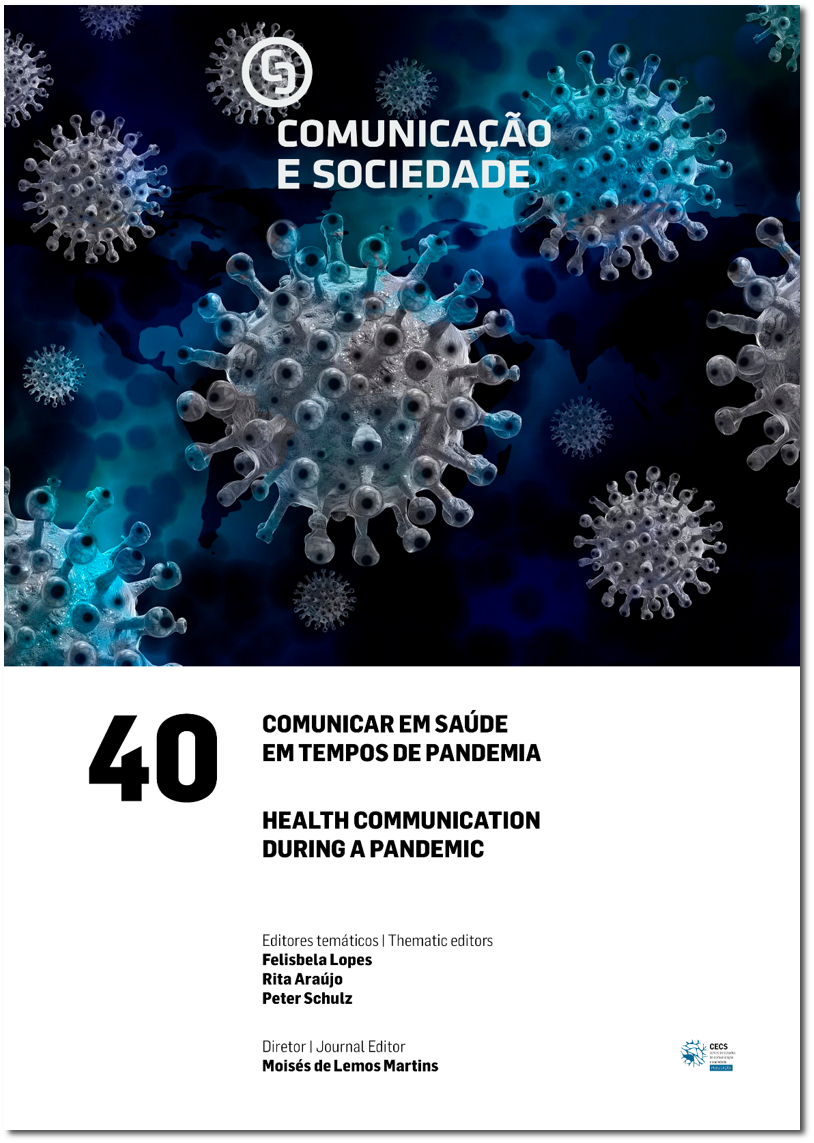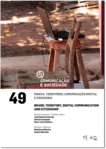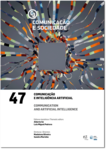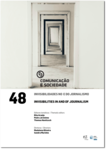Revisão Crítica: Uma Abordagem aos Estudos Sobre o Uso dos Media Sociais Durante a Pandemia Covid-19
DOI:
https://doi.org/10.17231/comsoc.40(2021).3174Palavras-chave:
utilização de media sociais, comunicação de risco em saúde, covid-19Resumo
Desde que a doença coronavírus (covid-19) foi declarada como uma emergência de saúde pública de interesse internacional pela Organização Mundial da Saúde em janeiro de 2020, levou à perda de milhões de vidas humanas e à recessão económica global. Cada vez mais, é reconhecida a necessidade de uma comunicação em saúde eficaz através dos media online, que possa fornecer informações credíveis e promover mudanças de comportamento relevantes. Assim, este estudo faz uma revisão sistemática da literatura, para compreender quais os conflitos de posição que existem e que lacunas de conhecimento permanecem em termos de uso dos media sociais durante a primeira vaga de covid-19, bem como indicar estratégias de comunicação relevantes. Esta pesquisa recolheu 76 artigos relevantes através de pesquisas na Web of Science e no Google Scholar. A análise revelou que grande parte da literatura veio confirmar o efeito positivo dos media sociais online na propagação de informações e promoção de precauções durante o controlo do covid-19. A propagação de rumores e a intervenção do governo nos media sociais têm aumentado as preocupações dos utilizadores. Atualmente, o debate continua sobre a associação entre a exposição aos media sociais e a saúde mental pública. Outra questão muito debatida é se os rumores são partilhados de forma mais ampla do que as informações verificadas e credíveis. Até agora, muito pouca atenção tem sido dada, nos media sociais, às disparidades e lacunas de informação e também aos grupos vulneráveis.
Downloads
Referências
Abd-Alrazaq, A., Alhuwail, D., Househ, M., Hamdi, M., & Shah, Z. (2020). Top concerns of tweeters during the covid-19 pandemic: Infoveillance study. Journal of Medical Internet Research, 22(4), Artigo e19016. https://doi.org/10.2196/19016
Ahmad, A. R., & Murad, H. R. (2020). The impact of social media on panic during the covid-19 pandemic in Iraqi Kurdistan: Online questionnaire study. Journal of Medical Internet Research, 22(5), Artigo e19556. https://doi.org/10.2196/19556
Apuke, O. D., & Omar, B. (2021). User motivation in fake news sharing during the covid-19 pandemic: An application of the uses and gratification theory. Online Information Review, 45(1), 220–239. https://doi.org/10.1108/oir-03-2020-0116
Ataç, Ö., Özalp, Y. C., Kurnaz, R., Güler, O. M., İnamlık, M., & Hayran, O. (2020). YouTube as an information source during the coronavirus disease (covid-19) pandemic: Evaluation of the Turkish and English content. Cureus, 12(10), Artigo 10795. https://doi.org/10.7759/cureus.10795
Azizan, M., Ismail, H. H., & Qaiwer, S. N. (2020). Power and solidarity in positive Facebook postings amidst covid-19 in Malaysia. Journal of Nusantara Studies (JONUS), 5(2), 329–364. https://doi.org/10.24200/jonus.vol5iss2pp329-364
Basch, C. H., Hillyer, G. C., Meleo-Erwin, Z. C., Jaime, C., Mohlman, J., & Basch, C. E. (2020). Preventive behaviors conveyed on YouTube to mitigate transmission of covid-19: Cross-sectional study. JMIR Public Health and Surveillance, 6(2), Artigo e18807. https://doi.org/10.2196/19601
Bowles, J., Larreguy, H., & Liu, S. (2020). Countering misinformation via WhatsApp: Preliminary evidence from the covid-19 pandemic in Zimbabwe. PloS One, 15(10), Artigo e0240005. https://doi.org/10.1371/journal.pone.0240005
Bruns, A., Harrington, S., & Hurcombe, E. (2020). ‘Corona? 5G? or both?’: The dynamics of covid-19/5G conspiracy theories on Facebook. Media International Australia, 177(1), 12–29. https://doi.org/10.1177/1329878x20946113
Burzyńska, J., Bartosiewicz, A., & Rękas, M. (2020). The social life of covid-19: Early insights from social media monitoring data collected in Poland. Health Informatics Journal, 26(4), 3056–3065. https://doi.org/10.1177%2F1460458220962652
Castells, M. (2002). The internet galaxy: Reflections on the internet, business and society. Oxford University Press. https://doi.org/10.1016/s0048-7333(02)00012-4
Chen, Q., Min, C., Zhang, W., Wang, G., Ma, X., & Evans, R. (2020). Unpacking the black box: How to promote citizen engagement through government social media during the covid-19 crisis. Computers in human behavior, 110, Artigo 106380. https://doi.org/10.1016/j.chb.2020.106380
Cinelli, M., Quattrociocchi, W., Galeazzi, A., Valensise, C. M., Brugnoli, E., Schmidt, A. L., Zola, P., Zollo, F., & Scala, A. (2020). The covid-19 social media infodemic. Scientific Reports, 10(1), 1–10. https://doi.org/10.1038/s41598-020-73510-5
Docimo, S., Jacob, B., Seras, K., & Ghanem, O. (2021). Closed Facebook groups and covid-19: An evaluation of utilization prior to and during the pandemic. Surgical Endoscopy, 35(9), 4986–4990. https://doi.org/10.1007/s00464-020-07971-0
Dollarhide, M. (2019). Social media definition. Investopedia. Retirado a 20 de julho, 2020, de http://billscomputerpot. com/menus/windows/SocialMedia.pdf
Dutta, A., Beriwal, N., Van Breugel, L. M., Sachdeva, S., Barman, B., Saikia, H., Nelson, U.-A., Mahdy, A., & Paul, S. (2020). YouTube as a source of medical and epidemiological information during covid-19 pandemic: A cross-sectional study of content across six languages around the globe. Cureus, 12(6), Artigo e8622. https://doi.org/10.7759/cureus.8622
Dwyer, P. D., & Minnegal, M. (2020). Covid-19 and Facebook in Papua New Guinea: Fly River Forum. Asia & the Pacific Policy Studies, 7(3), 233–246. https://doi.org/10.1002/app5.312
Eckert, S., Sopory, P., Day, A., Wilkins, L., Padgett, D., Novak, J., & Gamhewage, G. (2018). Health-related disaster communication and social media: Mixed-method systematic review. Health Communication, 33(12), 1389–1400. https://doi.org/10.1080/10410236.2017.1351278
Eghtesadi, M., & Florea, A. (2020). Facebook, Instagram, Reddit and TikTok: A proposal for health authorities to integrate popular social media platforms in contingency planning amid a global pandemic outbreak. Canadian Journal of Public Health, 111, 389–391. https://doi.org/10.17269/s41997-020-00343-0
El-Awaisi, A., O’Carroll, V., Koraysh, S., Koummich, S., & Huber, M. (2020). Perceptions of who is in the healthcare team? A content analysis of social media posts during covid-19 pandemic. Journal of Interprofessional Care, 34(5), 622–632. https://doi.org/10.1080/13561820.2020.1819779
Farooq, A., Laato, S., & Islam, A. N. (2020). Impact of online information on self-isolation intention during the covid-19 pandemic: Cross-sectional study. Journal of Medical Internet Research, 22(5), Artigo e19128. https://doi.org/10.2196/19128
Finset, A., Bosworth, H., Butow, P., Gulbrandsen, P., Hulsman, R. L., Pieterse, A. H., Street, R., Tschoetschel, R., & van Weert, J. (2020). Effective health communication - A key factor in fighting the covid-19 pandemic. Patient Education and Counseling, 103(5), 873. https://doi.org/10.1016/j.pec.2020.03.027
Galhardi, C. P., Freire, N. P., Minayo, M. C. D. S., & Fagundes, M. C. M. (2020). Fact or fake? An analysis of disinformation regarding the covid-19 pandemic in Brazil. Ciência & Saúde Coletiva, 25, 4201–4210. https://doi.org/10.1590/1413-812320202510.2.28922020
García, F. J. O., & Majuelos, I. M. (2020). Análisis de las principales tendencias aparecidas en TikTok durante el periodo de cuarentena por la covid-19. Revista Española de Comunicación en Salud, 243–252. https://doi.org/10.20318/recs.2020.5422
Glowacki, E. M., Wilcox, G. B., & Glowacki, J. B. (2021). Identifying# addiction concerns on twitter during the covid-19 pandemic: A text mining analysis. Substance abuse, 42(1), 39–46. https://doi.org/10.1080/08897077.2020.1822489
González Romo, Z. F., Iriarte Aguirre, S., & Garcia Medina, I. (2020). Pharmaceutical influencers on Instagram and their communication during the covid-19 pandemic crisis. Journal of Science Communication, 19(5), Artigo A04. https://doi.org/10.22323/2.19050204
Hernández-García, I., & Giménez-Júlvez, T. (2020). Characteristics of YouTube videos in Spanish on how to prevent covid-19. International Journal of Environmental Research and Public Health, 17(13), Artigo 4671. https://doi.org/10.3390/ijerph17134671
Igartua, J. J., Ortega-Mohedano, F., & Arcila-Calderón, C. (2020). Communication use in the times of the coronavirus. A cross-cultural study. Profesional de la información, 29(3), Artigo e290318. https://doi.org/10.3145/epi.2020.may.18
Ishikawa, H., & Kiuchi, T. (2010). Health literacy and health communication. BioPsychoSocial Medicine, 4(18). https://doi.org/10.1186/1751-0759-4-18
Isip-Tan, I. T., Gutierrez, J., & Bernardo, D. C. (2020). Use of Facebook to serve information needs of persons with diabetes amid the covid-19 pandemic. Journal of the ASEAN Federation of Endocrine Societies, 35(1), 32–37. https://www.asean-endocrinejournal.org/index.php/JAFES/article/view/835
Islam, T., Mahmood, K., Sadiq, M., Usman, B., & Yousaf, S. U. (2020). Understanding knowledgeable workers’ behavior toward covid-19 information sharing through WhatsApp in Pakistan. Frontiers in Psychology, 11, Artigo 572526. https://doi.org/10.3389/fpsyg.2020.572526
Kamiński, M., Szymańska, C., & Nowak, J. K. (2021). Whose tweets on covid-19 gain the most attention: Celebrities, political, or scientific authorities? Cyberpsychology, Behavior, and Social Networking, 24(2), 123–128. https://doi.org/10.1089/cyber.2020.0336
Kang, M., Kim, J. R., & Cha, H. (2018). From concerned citizens to activists: A case study of 2015 South Korean MERS outbreak and the role of dialogic government communication and citizens’ emotions on public activism. Journal of Public Relations Research, 30(5-6), 202–229. https://doi.org/10.1080/1062726X.2018.1536980
Khosla, V., & Pillay, P. (2020). Covid-19 in the South Pacific: Science communication, Facebook and ‘coconut wireless’. Journal of Science Communication, 19(5), Artigo A07. https://doi.org/10.22323/2.19050207
Kim, B. (2020). Effects of social grooming on incivility in covid-19. Cyberpsychology, Behavior, and Social Networking, 23(8), 519–525. https://doi.org/10.1089/cyber.2020.0201
Kivits, J. (2004). Researching the ‘informed patient’. Information, Communication & Society, 7(4), 510–530. https://doi.org/10.1080/1369118042000305629
Kligler-Vilenchik, N., Stoltenberg, D., de Vries Kedem, M., Gur-Ze’ev, H., Waldherr, A., & Pfetsch, B. (2020). Tweeting in the time of coronavirus: How social media use and academic research evolve during times of global uncertainty. Social Media+ Society, 6(3), 1–6. https://doi.org/10.1177%2F2056305120948258
Kouzy, R., Abi Jaoude, J., Kraitem, A., El Alam, M. B., Karam, B., Adib, E., & Baddour, K. (2020). Coronavirus goes viral: Quantifying the covid-19 misinformation epidemic on Twitter. Cureus, 12(3), Artigo e7255. https://doi.org/10.7759%2Fcureus.7255
Lázaro-Rodríguez, P. (2020). Covid-19, digital media, and Facebook: Interactions, treatment, and content analysis based on keywords of news on okdiario.com and eldiario.es. Profesional de la Información, 29(4). https://doi.org/10.3145/epi.2020.jul.09
Leelawat, N., Tang, J., Saengtabtim, K., & Laosunthara, A. (2020). Trends of tweets on the coronavirus disease-2019 (covid-19) pandemic. Journal of Disaster Research, 15(4), 530–533. https://doi.org/10.20965/jdr.2020.p0530
Li, L., Zhang, Q., Wang, X., Zhang, J., Wang, T., Gao, T. L., Duan, W., Tsoi, K. K., & Wang, F. Y. (2020). Characterizing the propagation of situational information in social media during covid-19 epidemic: A case study on Weibo. IEEE Transactions on Computational Social Systems, 7(2), 556–562. https://doi.org/10.1109/TCSS.2020.2980007
Li, Q., Wei, C., Dang, J., Cao, L., & Liu, L. (2020). Tracking and analyzing public emotion evolutions during covid-19: A case study from the event-driven perspective on microblogs. International Journal of Environmental Research and Public Health, 17(18), Artigo 6888. https://doi.org/10.3390/ijerph17186888
Li, Y., Twersky, S., Ignace, K., Zhao, M., Purandare, R., Bennett-Jones, B., & Weaver, S. R. (2020). Constructing and communicating covid-19 stigma on Twitter: A content analysis of tweets during the early stage of the covid-19 outbreak. International Journal of Environmental Research and Public Health, 17(18), Artigo 6847. https://doi.org/10.3390/ijerph17186847
Liao, Q., Yuan, J., Dong, M., Yang, L., Fielding, R., & Lam, W. W. T. (2020). Public engagement and government responsiveness in the communications about covid-19 during the early epidemic stage in China: Infodemiology study on social media data. Journal of Medical Internet Research, 22(5), Artigo e18796. https://doi.org/10.2196/18796
López-Carril, S., & Anagnostopoulos, C. (2020). Covid-19 and soccer teams on instagram: The case of corporate social responsibility. International Journal of Sport Communication, 13(3), 447–457. https://doi.org/10.1123/ijsc.2020-0230
Lu, H., Lou, Y., Jin, B., & Xu, M. (2020). What is discussed about covid-19: A multi-modal framework for analyzing microblogs from Sina Weibo without human labeling. Cmc-Computers Materials & Continua, 1453–1471. https://doi.org/10.32604/cmc.2020.011270
Ma, R., Deng, Z., & Wu, M. (2020). Effects of health information dissemination on user follows and likes during covid-19 outbreak in China: Data and content analysis. International journal of Environmental Research and Public Health, 17(14), Artigo 5081. https://doi.org/10.3390/ijerph17145081
Malecki, K. M., Keating, J. A., & Safdar, N. (2021). Crisis communication and public perception of covid-19 risk in the era of social media. Clinical Infectious Diseases, 72(4), 697–702. https://doi.org/10.1093/cid/ciaa758
Malhotra, P. (2020). A relationship-centered and culturally informed approach to studying misinformation on covid-19. Social Media+ Society, 6(3), 1–4. https://doi.org/10.1177%2F2056305120948224
Manganello, J., Bleakley, A., & Schumacher, P. (2020). Pandemics and PSAs: Rapidly changing information in a new media landscape. Health Communication, 35(14), 1711–1714. https://doi.org/10.1080/10410236.2020.1839192
Mohamad, S. M. (2020). Creative production of ‘covid-19 social distancing’narratives on social media. Tijdschrift voor economische en sociale geografie, 111(3), 347–359. https://doi.org/10.1111/tesg.12430
Murri, R., Segala, F. V., Del Vecchio, P., Cingolani, A., Taddei, E., Micheli, G., & COVID II Columbus Group. (2020). Social media as a tool for scientific updating at the time of covid pandemic: Results from a national survey in Italy. Plos One, 15(9), Artigo e0238414. https://doi.org/10.1371/journal.pone.0238414
Mutanga, M. B., & Abayomi, A. (2020). Tweeting on covid-19 pandemic in South Africa: LDA-based topic modelling approach. African Journal of Science, Technology, Innovation and Development, 1–10. https://doi.org/10.1080/20421338.2020.1817262
Ngai, C. S. B., Singh, R. G., Lu, W., & Koon, A. C. (2020). Grappling with the covid-19 health crisis: Content analysis of communication strategies and their effects on public engagement on social media. Journal of Medical Internet Research, 22(8), Artigo e21360. https://doi.org/10.2196/21360
Nutbean, D. (2006). Health literacy as a public health goal: A challenge for a contemporary health education and communication strategies into the 21st century. Health Promotion International, 15(3), 259–267. https://doi.org/10.1093/heapro/15.3.259
Obi-Ani, N. A., Anikwenze, C., & Isiani, M. C. (2020). Social media and the covid-19 pandemic: Observations from Nigeria. Cogent Arts & Humanities, 7(1), Artigo 1799483. https://doi.org/10.1080/23311983.2020.1799483
Orduna-Malea, E., Font-Julian, C. I., & Ontalba-Ruiperez, J. A. (2020). Covid-19: Metric analysis of videos and communication channels on YouTube. Professional de la información, 29(4). https://doi.org/10.3145/epi.2020.jul.01
Pahayahay, A., & Khalili-Mahani, N. (2020). What media helps, what media hurts: A mixed methods survey study of coping with covid-19 using the media repertoire framework and the appraisal theory of stress. Journal of Medical Internet Research, 22(8), Artigo e20186. https://doi.org/10.2196/20186
Pena-y-Lillo, M. (2020). Tweets de la autoridad sanitaria en Chile en los albores de la crisis del coronavirus. Revista Española de Comunicación en Salud, 117–127. https://doi.org/10.20318/recs.2020.5447
Pérez-Escoda, A., Jiménez-Narros, C., Perlado-Lamo-de-Espinosa, M., & Pedrero-Esteban, L. M. (2020). Social networks’ engagement during the covid-19 pandemic in Spain: Health media vs. healthcare professionals. International Journal of Environmental Research and Public Health, 17(14), Artigo 5261. https://doi.org/10.3390/ijerph17145261
Prayoga, K. (2020). How Jokowi Communicates with the public during covid-19 crisis: An analysis of tweets on Twitter. Jurnal Komunikasi: Malaysian Journal of Communication, 36(2), 434–456. https://doi.org/10.17576/JKMJC-2020-3602-26
Pulido, C. M., Villarejo-Carballido, B., Redondo-Sama, G., & Gómez, A. (2020). Covid-19 infodemic: More retweets for science-based information on coronavirus than for false information. International Sociology, 35(4), 377–392. https://doi.org/10.1177%2F0268580920914755
Raamkumar, A. S., Tan, S. G., & Wee, H. L. (2020a). Measuring the outreach efforts of public health authorities and the public response on facebook during the covid-19 pandemic in early 2020: Cross-country comparison. Journal of Medical Internet Research, 22(5), Artigo e19334. https://doi.org/10.2196/19334
Raamkumar, A. S., Tan, S. G., & Wee, H. L. (2020b). Use of health belief model–based deep learning classifiers for covid-19 social media content to examine public perceptions of physical distancing: Model development and case study. JMIR Public Health and Surveillance, 6(3), Artigo e20493. https://doi.org/10.2196/20493
Rafi, M. S. (2020). Dialogic content analysis of misinformation about covid-19 on social media in Pakistan. Linguistics and Literature Review, 6(2), 131–143. https://doi.org/10.32350/llr.62.12
Rao, H. R., Vemprala, N., Akello, P., & Valecha, R. (2020). Retweets of officials’ alarming vs reassuring messages during the covid-19 pandemic: Implications for crisis management. International Journal of Information Management, 55, Artigo 102187. https://doi.org/10.1016/j.ijinfomgt.2020.102187
Riehm, K. E., Holingue, C., Kalb, L. G., Bennett, D., Kapteyn, A., Jiang, Q., Veldhuis, C. B., Johnson, R. M., Fallin, M. D., Kreuter, F., Stuart, E. A., & Thrul, J. (2020). Associations between media exposure and mental distress among US adults at the beginning of the covid-19 pandemic. American journal of Preventive Medicine, 59(5), 630–638. https://doi.org/10.1016/j.amepre.2020.06.008
Rodríguez, C. P., Carballido, B. V., Redondo-Sama, G., Guo, M., Ramis, M., & Flecha, R. (2020). False news around covid-19 circulated less on Sina Weibo than on Twitter. How to overcome false information? International and Multidisciplinary Journal of Social Sciences, 9(2), 107–128. https://doi.org/10.17583/rimcis.2020.5386
Rovetta, A., & Bhagavathula, A. S. (2020). Global infodemiology of covid-19: Analysis of Google web searches and Instagram hashtags. Journal of Medical Internet Research, 22(8), Artigo, 20673. https://doi.org/10.2196/20673
Ruffer, N., Knitza, J., & Krusche, M. (2020). # Covid4Rheum: An analytical Twitter study in the time of the covid-19 pandemic. Rheumatology International, 40(12), 2031–2037. https://doi.org/10.1007/s00296-020-04710-5
Sasaki, N., Kuroda, R., Tsuno, K., & Kawakami, N. (2020). Exposure to media and fear and worry about covid-19. Psychiatry and Clinical Neurosciences, 74(9), 501–502. https://doi.org/10.1111/pcn.13095
Saud, M., Mashud, M. I., & Ida, R. (2020). Usage of social media during the pandemic: Seeking support and awareness about covid-19 through social media platforms. Journal of Public Affairs, 20(4), Artigo 2417. https://doi.org/10.1002/pa.2417
Schiavo, R. (2013). Health communication: From theory to practice. John Wiley & Sons. https://doi.org/10.1108/ijhcqa.06226haa.014
Schwenk, E. S., Jaremko, K. M., Gupta, R. K., Elkassabany, N. M., Pawa, A., Kou, A., & Mariano, E. R. (2020). How Twitter conversations using hashtags# regionalanesthesia and# regionalanaesthesia have changed in the covid-19 era. Regional Anesthesia & Pain Medicine, 45(10), 765–766. https://doi.org/10.1136/rapm-2020-101747
Sutton, J., Renshaw, S. L., & Butts, C. T. (2020). The first 60 days: American public health agencies’ social media strategies in the emerging covid-19 pandemic. Health Security, 18(6), 454–460. https://doi.org/10.1089/hs.2020.0105
Szmuda, T., Syed, M. T., Singh, A., Ali, S., Özdemir, C., & Słoniewski, P. (2020). YouTube as a source of patient information for coronavirus disease (covid-19): A content-quality and audience engagement analysis. Reviews in Medical Virology, 30(5), Artigo e2132. https://doi.org/10.1002/rmv.2132
Thelwall, M., & Thelwall, S. (2020). A thematic analysis of highly retweeted early covid-19 tweets: Consensus, information, dissent and lockdown life. Aslib Journal of Information Management, 72(6), 945–962. https://doi.org/10.1108/AJIM-05-2020-0134
Trajkova, M., Cafaro, F., Vedak, S., Mallappa, R., & Kankara, S. R. (2020). Exploring casual covid-19 data visualizations on Twitter: Topics and challenges. Informatics, 7(3), Artigo 35. https://doi.org/10.3390/informatics7030035
Vicari, S., & Murru, M. F. (2020). One platform, a thousand worlds: On Twitter irony in the early response to the covid-19 pandemic in Italy. Social Media+ Society, 6(3), Artigo 2056305120948254. https://doi.org/10.1177%2F2056305120948254
Viswanath, K., Lee, E. W., & Pinnamaneni, R. (2020). We need the lens of equity in covid-19 communication. Health Communication, 35(14), 1743–1746. https://doi.org/10.1080/10410236.2020.1837445
Wicke, P., & Bolognesi, M. M. (2020). Framing covid-19: How we conceptualize and discuss the pandemic on Twitter. PloS One, 15(9), Artigo 0240010. https://doi.org/10.1371/journal.pone.0240010
Wong, R., Harris, J. K., Staub, M., & Bernhardt, J. M. (2017). Local health departments tweeting about Ebola: Characteristics and messaging. Journal of Public Health Management and Practice, 23(2), e16–e24. https://doi.org/10.1097/PHH.0000000000000342
World Health Organization. (2020). Coronavirus disease situation dashboard. https://covid19.who.int
Wu, Y., Deng, M., Wen, X., Wang, M., & Xiong, X. (2020). Statistical analysis of dispelling rumors on Sina Weibo. Complexity, 2020, Artigo 3176593. https://doi.org/10.1155/2020/3176593
Yang, C. C., Tsai, J. Y., & Pan, S. (2020). Discrimination and well-being among Asians/Asian Americans during covid-19: The role of social media. Cyberpsychology, behavior, and social networking, 23(12), 865–870. https://doi.org/10.1089/cyber.2020.0394
Yin, F., Lv, J., Zhang, X., Xia, X., & Wu, J. (2020). Covid-19 information propagation dynamics in the Chinese Sina-microblog. Mathematical Biosciences and Engineering, 17(3), Artigo 26762692. https://doi.org/10.3934/mbe.2020146
Yin, F., Xia, X., Song, N., Zhu, L., & Wu, J. (2020). Quantify the role of superspreaders-opinion leaders-on covid-19 information propagation in the Chinese Sina-microblog. Plos One, 15(6), Artigo e0234023. https://doi.org/10.1371/journal.pone.0234023
Yüce, M. Ö., Adalı, E., & Kanmaz, B. (2021). An analysis of YouTube videos as educational resources for dental practitioners to prevent the spread of covid-19. Irish Journal of Medical Science (1971-), 190(1), 19–26. https://doi.org/10.1007/s11845-020-02312-5
Zhang, D., Zhou, L., & Lim, J. (2020). From networking to mitigation: The role of social media and analytics in combating the covid-19 pandemic. Information Systems Management, 37(4), 318–326. https://doi.org/10.1080/10580530.2020.1820635
Zhang, L. T., & Zhao, S. (2020). Diaspora micro-influencers and covid-19 communication on social media: The case of Chinese-speaking YouTube vloggers. Multilingua, 39(5), 553–563. https://doi.org/10.1515/multi-2020-0099
Zhao, N., & Zhou, G. (2020). Social media use and mental health during the covid-19 pandemic: Moderator role of disaster stressor and mediator role of negative affect. Applied Psychology: Health and Well-Being, 12(4), 1019–1038. https://doi.org/10.1111/aphw.12226
Downloads
Publicado
Como Citar
Edição
Secção
Licença
Direitos de Autor (c) 2021 Cheng Cheng, Rita Espanha

Este trabalho encontra-se publicado com a Creative Commons Atribuição-NãoComercial 4.0.
Os autores são titulares dos direitos de autor, concedendo à revista o direito de primeira publicação. O trabalho é licenciado com uma Licença Creative Commons - Atribuição 4.0 Internacional.











